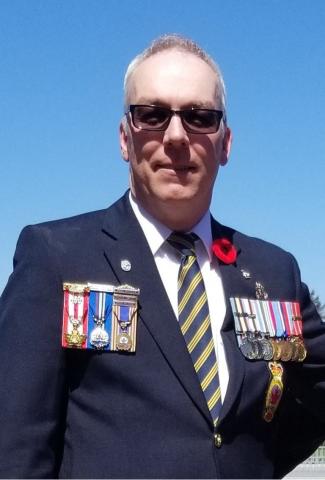
Joined
1983
Postings
- Cold Lake, AB
- Petawawa, ON
- Winnipeg, MB
- Victoria, BC
- Trenton, ON
Deployments
- 1985-1986: Golan Heights
- 1988: Iran
- Gulf war
- 1995: Haiti
- 2005: HMCS Winnipeg
Warrant Officer Robert McDougall (Ret’d) describes his entry into the CAF as a comedy of errors. In the fall of 1982, he joined a close friend who was on his way to enlist. As they pulled up to the Recruiting Centre in Peterborough, Ontario, McDougall was dragged into the presentation and testing. “I told them I’m good, I’m going to college. But I listened just to preserve the peace. Turns out the recruiters were very convincing.”
“Three years went by with not a lot of excitement. My boss saw me walking down the hallway and said ‘Well, what’s your plan?’ I said ‘I’m done, I’m going back to school.”
McDougall accepted an employment offer in January 1983 and started basic training on Valentine’s Day. By fall, he qualified as a medical assistant and was assigned to work in Cold Lake, Alberta. At the time, McDougall had no intentions of making a career of the military. The CAF was a short-term solution to pay for his education. “Three years went by with not a lot of excitement. My boss saw me walking down the hallway and said ‘Well, what’s your plan?’ I said ‘I’m done, I’m going back to school.’”
A promotion to Corporal convinced McDougall to stick around, and in June 1986 he went on his first overseas tour to the Golan Heights. There, he helped run a small medical clinic for the Canadian peacekeeping contingent. When he returned to Canada, he transferred to Petawawa. In 1988, he deployed to northern Iran with the United Nations (UN) Iran-Iraq military observer group, once again looking after our own at a small medical clinic.
McDougall’s third overseas tour was to familiar grounds: “In the Fall of 1990, we saw things started to change in Kuwait and Iraq, so we knew something was going to come up, we just didn’t know what our involvement was going to be.”
That August, Canada had announced it was joining a coalition made up of over 35 countries to liberate Kuwait from the Iraqi invasion. Canadians played an important role in the medical field during the Gulf War, notably by running a field hospital at Al Qaysumah, Saudi Arabia. McDougall was one of more than 4,000 Canadians who served in the Middle East during the conflict.

McDougall in his chemical protective gear during the Gulf War.
He arrived in Al Jubail, Saudi Arabia, in January 1991, and received training on advanced life trauma support from the British military. From there, he went to Al Qaysumah to help setup the First Canadian field hospital, joining the existing British one to increase capacity.
Air combat broke out in mid-January 1991 before the majority of Canadian medical staff had even arrived at the field hospital. Those already on the ground, like McDougall, looked after the Iraqi soldiers made prisoners of war. “They came in with a variety of injuries in a variety of states. They were not well nourished,” he says.
While the field hospital was far enough away from combat to be considered relatively safe, McDougall still recalls feelings of uneasiness. The biggest concern was the frequent SCUD missile alerts. Nobody knew where they would fall or if they carried chemical agents. “It certainly kept us on our toes and we learned to get into our suits pretty quick.”
“It was a very different time, under certainly different conditions than what I had anticipated doing. But it’s what I signed up for, and having that experience was irreplaceable.”
For McDougall, the Gulf War experience was eye-opening compared to his previous deployments to the region. “It was a very different time, under certainly different conditions than what I had anticipated doing. But it’s what I signed up for, and having that experience was irreplaceable.”
After the Gulf War, McDougall returned to the base in Petawawa where he continued to treat our soldiers. He deployed on missions overseas twice more. In 2008, after 25 years with the CAF, he retired as a Warrant Officer and accepted a position at the Emergency department of the hospital in Lindsay, Ontario.
McDougall looks back fondly on his service years. “I was one of the lucky guys! Joined, travelled the world. I was very fortunate. I have no regrets about what I did!”
With courage, integrity and loyalty, Robert McDougall is leaving his mark. He is a Canadian Armed Forces Veteran. Discover more stories.
If you a Veteran, family member or caregiver in need of mental health support, the VAC Assistance Service is available to you 24/7, 365 days a year at no cost. Call "1-800-268-7708 to speak to a mental health professional right now.